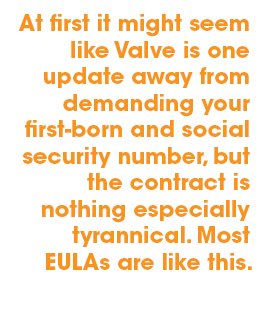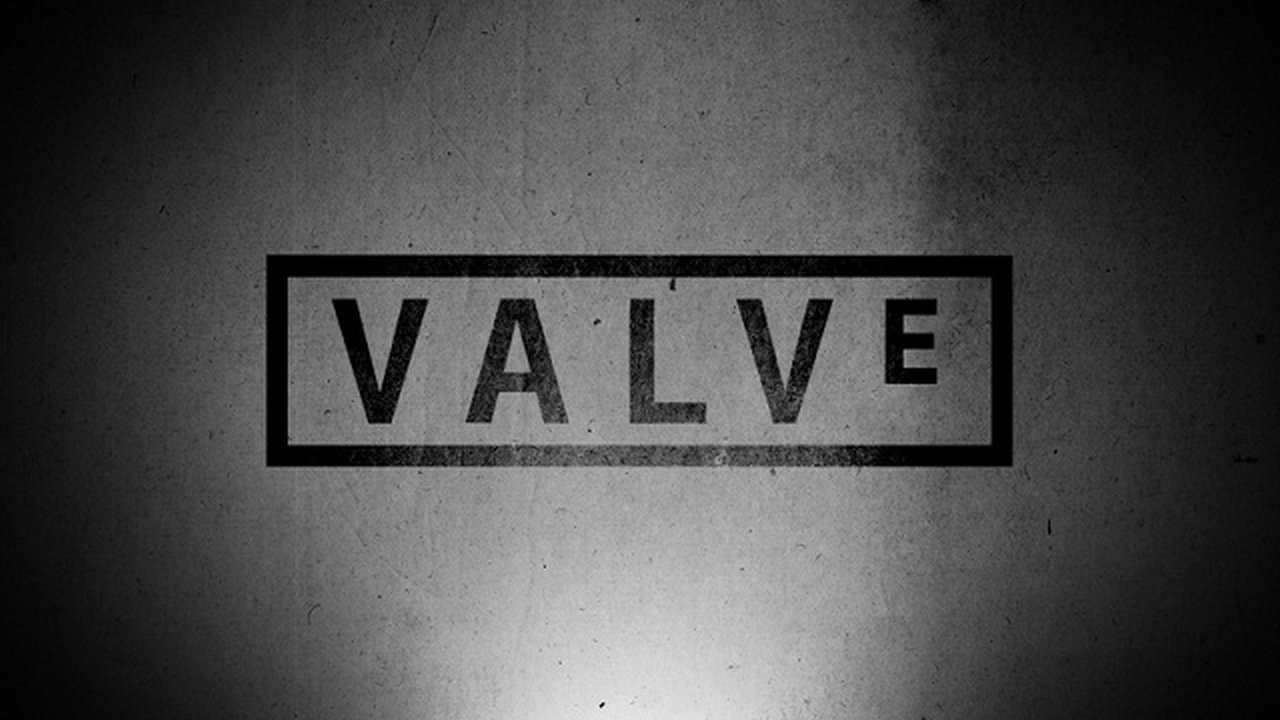Generalities are easy and cheap, but it’s pretty safe to say gamers love Steam.
And there is plenty to love: a huge catalogue, big sales, community tools, cloud hosting, even built-in chat and web browsing. With over 40 million users and counting, it’s undoubtedly become an integral part of computer gaming today. While the platform was not nearly as popular at release and continues to receive valid criticism (cumbersome size and speed, forced updates, online authentication), Steam gets better all the time and popular opinion reflects that.
However, the last two months have seen Valve roll out or announce a number of new features that do far more than simply update the service. Rather, they are fundamentally changing how some of us think about Steam, for better or ill.
An outbreak of kneejerk panic arose in July from what appears to be increasingly draconian updates to Steam’s end user license agreement: that longwinded legalese most users click through without a second thought. When news broke that bureaucratic shenanigans were afoot, the gaming public uncovered plenty of disturbing concessions, including:
- 1.“You understand that you…are giving up the right to sue in court and to have a trial before a judge or jury.”
- 2.“You expressly grant Valve… the complete and irrevocable right to use, reproduce, modify…distribute…and publicly display [user-generated content] in any form, anywhere, with or without attribution to you, and without any notice or compensation to you of any kind.”
At first it might seem like Valve is one update away from demanding your first-born and social security number, but the contract is nothing especially tyrannical. Most EULAs are like this. Two things to consider: such agreements are often a preventative scare tactic or fallback legal defence. Their rules may be found illegitimate or even illegal, depending on your place of residence; and even if you can’t sue, there’s always arbitration or small claims court. And as for the second point, just because Valve can “use” your creations does not mean they own or can sell it. This clause is necessary for the company to be able to display your content to other people at all—which is, generally, why you created it.

No, the legitimate concerns brought forth in the last two months are of a subtler nature. Embracing today’s Kickstarter, consumer-driven culture, Valve will launch Steam Greenlight by the end of the month. In recent years the company has been attacked by developers claiming their games have been rejected from Steam for arbitrary reasons (they are, in fact, denied the reasons why). Greenlight will put the power in the hands of consumers, who can now vote on titles they want distributed. This is great, in theory: Valve saves itself some time, developers are ensured a fair appraisal and players get to support and buy whatever they want. Yes, democracy is great, but modern civilization has proven time and again that the system isn’t perfect. Niche games have the most to win or lose from Greenlight; vocal fan support could boost an oddball game from an unknown developer onto Steam, but there’s also the risk of turning the proceedings into a popularity contest where good looks and mass appeal are all that matter. While Greenlight may turn out to be an unqualified success, it’s equally possible the Ancien Régime was the way to go.
Perhaps the biggest upset of all came earlier this month when Valve announced it will begin distributing non-game software on September 5, bringing itself into more direct competition with the App Store, Windows Store and Google Play. Imagine installing Steam on a new computer and having immediate access to your word processor and all of your documents hosted on the cloud. While many have joked about productivity loss—think you’ll get any work done when Excel is right next to Everquest?—others fear that Valve will lose its focus on producing and providing quality games. This concern would be far more valid if Microsoft or Sony were making the move, rather than a smaller, dedicated game company. The initiative’s reach depends on what mainstream software Valve is able to acquire, and Valve probably lacks the industry clout to pick up Microsoft Office or Adobe CS6. That said, there is a reason gamers have coined the term “Valve time”; the company doesn’t need any more distractions.
If there is truly anything to fear from Steam, it will be its successes rather than its failures. Valve is extremely well situated in the industry: Steam dominates digital game distribution, and any tycoon will tell you the key to power is running the infrastructure. Most importantly, the model’s continued success ensures games will continue to be sold as licenses, not products. Unlike titles downloaded from, say, Good Old Games, you don’t truly own your purchases. Should Valve disappear or ban your account or release new terms you won’t accept, those games are gone. In all likelihood, you will not be dusting off your favourite RPG in 20 years—perhaps even five or 10. These aren’t new reservations of course, but as Steam grows they become ever more compelling. And they aren’t going away
.




